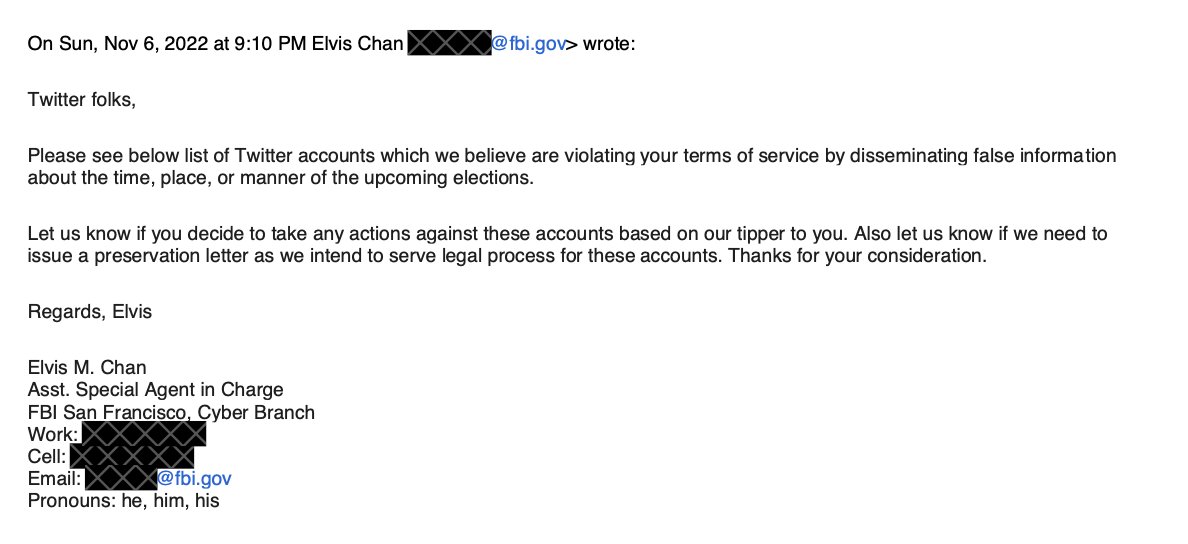Last August, Elon Musk offered to pay the legal bills for users who “were unfairly treated by your employer due to posting or liking something on this platform.” He has followed through by funding lawsuits from former Mandalorian star Gina Carano, whom Disney fired over tweets critical of J6 hysteria; Chloe Happe, or @bronzeageshawty, whom Jack Dorsey’s company Block fired for politically incorrect tweets about transgenders; and Dr. Kulvinder Kaur Gill, a Canadian physician whom the old Twitter regime censored and who faced state-sponsored “cautions” being placed on her permanent public record for questioning the efficacy of lockdowns and vaccines.
If Musk wants to continue to defend the free speech of X users in court, the most important case now is the government’s unjust prosecution of Doug Mackey. Mackey was sentenced to seven months in prison for posting a meme about Hillary Clinton last year and is appealing his case to the Second Circuit Court of Appeals on Friday.
Beyond being “the most shocking attack on freedom of speech in this country in our lifetimes,” according to Tucker Carlson, the old regime at Twitter was instrumental in Mackey’s prosecution, and the FBI has used it as precedent to continue to harass X.
Revolver has already written extensively on Mackey’s case. To recap: Douglass Mackey ran the legendary pro-Trump anonymous account @RickyVaughn99 prior to the 2016 election. He posted two memes on 4chan that joked that you could vote by text message and posted them on his account. Four years later, less than a week into the Biden administration, FBI agents showed up at his house and arrested him under 18 USC 241, conspiracy against civil rights—a law enacted to punish Klan violence. Prosecutors could not produce a single person who took the meme seriously, let alone failed to vote because of it.
To make matters worse, the government indicted Mackey in Brooklyn’s Eastern District of New York, where Clinton’s campaign was headquartered, and she won 79% of the vote. Neither Mackey nor his “co-conspirators” (i.e., members of pro-Trump group chats) ever set foot in the district. At trial, the Southern Poverty Law Center intimidated one of Mackey’s expert witnesses from testifying by threatening to go contact his employer, and the judge allowed it.
The Brooklyn jury convicted Mackey after nearly a week of deadlock. An Obama-appointed judge sentenced him to seven months in prison… for a meme. As President Trump succinctly put it, “They are putting Douglass Mackey in jail for sharing a joking meme about Hillary Clinton seven years ago. Nobody ever heard of anything like that.”
🚨 President Trump SLAMS the weaponization of government 🚨
“They’re putting Douglass Mackey in jail for sharing a joking meme about Hillary Clinton seven years ago. Nobody ever heard of anything like that."
🔁https://t.co/9ibKA3L1xp pic.twitter.com/yYBCpKTIRE
— Culture War (@CultureWar2020) December 6, 2023
How the Old Regime at Twitter Aided the Unlawful Prosecution
During oral arguments on Mackey’s motion to dismiss, the government noted their interest in the case emerged when “Senator Klobuchar, for example, on October 31st of 2017, about a year after the election, held a hearing on this sort of conduct.” They were referring to an Intelligence Committee hearing on “social media and Russian influence in the 2016 elections.”
Sean Edgett, then Twitter’s acting general counsel, testified at this hearing. In his opening statement, he bragged about turning over Mackey’s tweets to the committee, noting that “Twitter identified and has since provided to the Committee, examples of tweets with images in English and Spanish that encouraged Clinton supporters to vote online, vote by phone, or vote by text.”
When Diane Feinstein asked about the tweet, Edgett responded, “We began to remove it as illegal voter suppression.” After Amy Klobuchar displayed a blown-up posterboard of the tweet, he reiterated that it was “illegal voter suppression.”
This is where the federal prosecution of Doug Mackey began: in a highly partisan, Russiagate-panic Senate hearing. pic.twitter.com/7JqdxLXeiM
— Revolver News (@RevolverNewsUSA) April 1, 2024
Edgett did not specify what law Mackey broke, because no such law exists. Don’t take our word for it. In 2007, Sen. Chuck Schumer said, “It is not a federal crime to disenfranchise voters by deception.”
Jasmine Tolson, a senior legal operations associate at Twitter, also testified for the government to help build their case that groupchats and retweets could be part of a “conspiracy.”
At the hearing, Sen. Klobuchar compared Mackey’s case to U.S. v. Tobin, where James Tobin was charged with violating Section 241 for allegedly jamming up the phone lines of a get-out-the vote effort. (Tobin was ultimately acquitted.) As Mackey noted in his briefs, this case has nothing to do with supposedly deceptive speech, and even left-wing groups admit that it does not address “whether a deceptive practice constitutes an injury to the right to vote.”
Regardless, this hearing prompted the FBI to start investigating the memes. The government’s entire case was based on Mackey’s tweets and DMs. His account had long been suspended, so the FBI did not have access to this content. However, Twitter happily turned over his posts and private messages.
This collusion with the FBI stands in direct contrast with how Twitter treats law enforcement requests about left-wing users. In 2012, Twitter tried to quash a Manhattan DA’s subpoena of left-wing activist and journalist Malcolm Harris’s deleted tweets on the grounds that “it imposes a new and overwhelming burden on Twitter to fight for its users’ rights.” Harris had helped shut down traffic on the Brooklyn Bridge during the Occupy Wall Street protests and then deleted his tweets documenting his lawbreaking. In 2016, Twitter even instituted a policy to hinder law enforcement from monitoring public posts organizing violent protests after Black Lives Matter activists complained.
As noted, Mackey was prosecuted in Brooklyn despite having never set foot in the district, violating his Sixth Amendment right to have a trial venue in the “district wherein the crime shall have been committed.” In order to circumvent his constitutional rights, the government argued he committed the crime in the Eastern District because his tweets passed through wires in the Eastern District of New York when traveling to Twitter servers in Sacramento and Atlanta. Twitter engineer Michael Anderson voluntarily testified for the prosecution, divulging more confidential information about Mackey to make this tortured argument.
Based on the old Twitter regime’s cooperation, the FBI felt comfortable using Mackey’s prosecution to justify continued pressure. As exposed in the Twitter Files, disgraced FBI Agent Elvis Chan emailed Twitter ahead of the 2022 election, saying, “Please see below list of Twitter accounts which we believe are violating your terms of service by disseminating false information about the time, place, or manner of the upcoming elections. Let us know if you decide to take any actions against these accounts based on our tipper to you. Also let us know if we need to issue a preservation letter as we intend to serve legal process for these accounts. Thanks for your consideration.”
In sum, the Twitter lawyers who Elon fired colluded with the FBI and Biden Justice Department to persecute Doug Mackey for memes. The FBI is trying to use this case as precedent to intimidate X and other social media platforms into more censorship.
Despite this outrage, Mackey has a very strong case on appeal. Harvard Law Review published a case note arguing that his prosecution violated the First Amendment. Many law professors, including Eugene Volokh, one of the leading experts on the First Amendment, have filed briefs showing his prosecution violated the First and Fifth Amendments.
However, this case is extremely expensive, and Doug is now in hundreds of thousands of dollars of debt. Whether Elon funds it or not, it’s imperative that anyone who cares about internet freedom continue to support Doug’s defense. You can do so via one of the following methods:
The Meme Defense Fund (tax-deductible, 501(c)3 non-profit foundation)
Send cash, check, or money order made out to Douglass Mackey to:
Douglass Mackey
PO Box 6332
Delray Beach, FL 33482
Crypto:
Bitcoin: bc1qp53hutv9d0qngyvm3wcxeyhnp0srcysghnrhj9
Ethereum: 0xBb078c6823B0d0d35738aa55f0a7F36CA37e4434
Litecoin: ltc1qp7m4ll7ckw77jtraj9rl7xuve56q45d850k4dq
Monero: 41kkLhRfRXVJo9ts5pdZcJ3LUUddhtTsLTMWKi8bi32Ve1Djmz7GxBF957hTyh4yPfK3XxYCQGXYTdv4ur46mjJp5NJZaUi





Join the Discussion